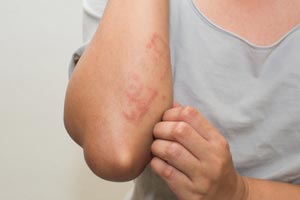Can I Go to Urgent Care for Eczema

A rash can be a sign that you sat on some grass that irritates your skin, or it can signal far more serious things, like an autoimmune disorder, Lyme disease or a serious allergic reaction.
#1. Your rash is accompanied by fever or pain.
If you have pain and fever along with your rash, chances are you need to head over to urgent care. This could indicate an underlying infection or a more serious allergic reaction.
#2. Your rash sparks a sudden spreading of bruise-like lesions.
The cause of this alarming outbreak might be a symptom of vasculitis. Vasculitis is rare with fewer than 200,000 diagnosed cases per year in the US. It causes your vessel walls to thicken and narrow, limiting vital blood supply to your organs and tissues. There is no cure but treatment is available following a medical diagnoses. Lab tests or imaging are required to diagnose vasculitis.
#3. Your rash is not confined to one area on your body, but instead covers a large stretch of skin.
Any widespread rash is a warning sign of a major allergic reaction. It's important to visit a doctor and tell him or her if you made any changes, such as starting a new medication, in the last 2 weeks.
#4. Your rash is not getting any better.
If your rash is not clearing up it could be a sign of infection. Sometimes a rash starts off as benign but then a secondary infection develops and causes issues that require medical attention. Some common symptoms of infected rashes include: warmth, pain and yellow or green discharge that appears cloudy and has a foul odor.
#5. You have a circular shaped rash.
If you notice a circular shaped rash developing on your skin and you have been to or live in an area prone to Lyme disease, you need to be checked out as soon as possible.
#6. Your rash starts to blister.
If you've come into contact with poison ivy it's perfectly normal to develop blisters. If you're unsure why you have a rash and now it's blistering up, you should visit urgent care right away.
#7. There are purple spots on your hands and/or feet.
If you notice purple spots on your hands or feet, this is a serious red flag that should not be ignored. This can signal a bacterial infection of the heart.
When Is A Rash More Serious Than Just A Rash?
An ordinary rash will clear up and disappear, but if an unusual rash does not respond to treatment or is accompanied by joint pain, muscle aches, fever or other symptoms, it could be a sign that there's an internal infection or underlying problem. For instance, the American Academy of Dermatology acknowledges that a rash on the tops of your feet and lower legs that does not dissipate with topical steroids or antifungals may indicate hepatitis C infection.
If ever in doubt, visit Urgent Medical Center. It's quick, affordable and you don't need an appointment.
But What If I'm Not Ready To Go To The Doctor Just Yet?
Take a photo of your rash every single day. This gives you a great reference tool in order to decide if your rash is getting better, worse or staying the same. You can also show this to a doctor if you do decide to visit urgent care. This offers a beneficial look at how your rash has progressed and may aid in your diagnosis.
How To Get Relief From Skin Rashes
If your skin rash is moderately itchy or painful, you can apply over-the-counter antiseptics and ointments to help reduce discomfort. It's important to note that a lot of people are allergic to bacitracin and neomycin, two ingredients commonly found in topical ointments. Signs of an allergic reaction include if your rash becomes itchier or blisters after you apply the ointment.
-If your rash was caused by contact dermatitis, such as poison ivy, try using calamine lotion to find some relief.
-For more severe itching, apply hydrocortisone cream as many as 4 times a day until itching ceases.
-An oral antihistamine can help reduce itching.
-Apply coconut oil or tea tree oil for a more natural solution.
Can I Go to Urgent Care for Eczema
Source: http://www.urgentcarefl.com/7-signs-skin-rash-requires-trip-urgent-care/
0 Response to "Can I Go to Urgent Care for Eczema"
Post a Comment